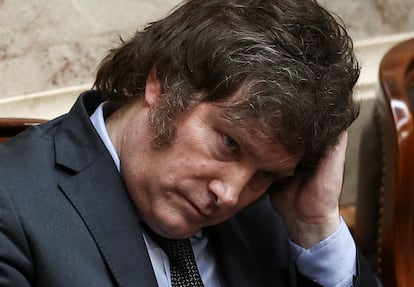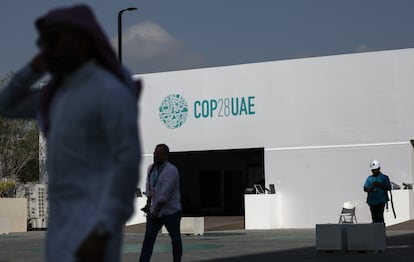Climate denier in the Casa Rosada: Milei’s arrival puts Argentina’s environmental agenda at risk
By the end of the COP28, the world conference on climate change that began Thursday, a new president will have taken the reins of the country: a right-wing libertarian who denies scientific evidence of the crisis and thinks it is ‘a socialist lie’

“All these politicians who blame the human race for climate change are fake and are only looking to raise money to finance socialist bums who write fourth-rate newspapers.” The ultra-right Javier Milei made his views on the climate crisis clear before becoming Argentina’s president-elect in November. Milei will take office on December 10, two days before COP28, the global conference about climate change, ends, after kicking off on Thursday. The arrival of a president who denies scientific evidence of the crisis opens up doubts around the future of the country’s environmental agenda, which has been driven by governments of varying political orientations in recent years and pushed forward by a grassroots protest movement.
The United Nations Climate Change Conference, COP28, began on Thursday in Dubai, United Arab Emirates. The participating countries — nearly 200 of them — will come together to make progress on the debates and negotiations necessary for dealing with the climate crisis. Argentina has sent a delegation of 11 people, representatives of the outgoing government of the Peronist Alberto Fernández. Among the delegation’s objectives is to take stock of the country’s compliance with the commitments it’s made to reduce greenhouse gas emissions in the Paris Agreement and discuss global financing to achieve those goals.
When they return home, they will have a new president, a leader who contradicts the international science community and denies that human activity is warming the atmosphere, ocean and land at an unprecedented rate. Milei, who is the head of the Freedom Advances party, and who won the second round of elections with 55.6% of votes in November, believes that climate change is “another socialist lie” and rejects the Paris Agreement, which Argentina signed in 2015, because he doesn’t believe in what he calls “cultural Marxism.”

The president’s positions are echoed by other members of his party. Vice President-elect Victoria Villarruel slammed the creation of national parks on the campaign trail and legislator-elect Bertie Benegas Lynch holds that “the environmental problem can be solved with property rights.” “Why don’t chickens and cows become extinct? Because they have an owner, because they are of economic use,” was his reasoning. These beliefs mirror those of Republican Donald Trump, who was elected president of the United States in 2016 saying that global warming is a lie, and pulled his country out of the Paris Agreement; or those of former far-right president Jair Bolsonaro, whose environmental policy was marked by the dismantling of governmental watchdogs in the Amazon.
The scientific community, however, has warned that climate change is “a threat to human well-being and the planet’s health” and that the “window of opportunity” humankind has to secure “a livable and sustainable future for all” is “rapidly closing,” according to the latest report of the U.N.’s Intergovernmental Panel on Climate Change (IPCC). Greenhouse emissions are not being reduced as rapidly and dramatically as would be necessary to keep temperatures from rising less than 2 ºC during this century.
In 2016, during the conservative administration of Mauricio Macri, Argentina ratified a commitment to reduce its emissions by 15% between 2020 and 2030. Four years later, with Alberto Fernández as president, it changed its bets and committed to reducing greenhouse gas emissions by 26% less than its initial proposal. The country has defined the fight against climate change as “a state policy.”
Confronted with such efforts by the government, citizen protests have placed a spotlight on the social discontent caused by the impacts of mining, oil and agro-industrial projects on local communities. In Añelo, the municipality at the epicenter of the hydrocarbon exploitation in Neuquén’s Vaca Muerta basin, neighbors have denounced the lack of water. In the coastal city Mar del Plata, injunctions have been filed to prevent offshore oil exploration and exploitation. In Río Negro, environmentalists and neighbors took to the streets to reject an oil port in the San Matías Gulf. In practice, the country continues to bet on agro-industry, oil and mining to attract dollars and heal an economy in crisis.
Although the allocation for ecology and environmental issues was 93 billion pesos ($257 million) in 2023, a budget analysis by the Environment and Natural Resources Foundation (FARN) concludes that “there is no genuine plan for energy transition” in the country. The organization highlights one fact: for every peso invested in “renewable energies and efficiency,” 184 are allocated to generation “with dirty energies.” For example, in recent years, the exploitation of hydrocarbons in Vaca Muerta has grown and hurdles removed for offshore exploitation in the Atlantic Ocean.
“If only we could not depend on these resources and leave them in the ground. We are in the transition towards this,” says the Secretary of Climate Change, Cecilia Nicolini, who heads up the Argentine COP28 delegation in Dubai. Nicolini defends the search for a “balance” between “the country’s growth” and the development of “cleaner and renewable sources,” but clarifies: “Not attending to the climate agenda means exposing ourselves to greater risks, more vulnerabilities and more economic losses.” The consequences are plain to see: the country is still suffering the effects of a historic drought that caused losses of more than 20 billion dollars, according to the government.
It’s anyone’s guess what kind of continuity the next government will give to the work that’s been done over the last decade. Nicolini expresses her desire to “make the transfer” so that policies “have continuity,” but she has not yet been in contact with the Freedom Advances team. Contacted by EL PAÍS, the president’s party has not confirmed its presence at the COP28 nor have they responded to whether there will be a transition process with the team who returns from the summit December 12.
It’s possible that this responsibility will fall to the lawyer Rodríguez Chirillo, who was confirmed this week “as the head of the Energy portfolio” by the entering government. This is a possibility because the position of Minister of the Environment will disappear, according to promises made by Milei during his campaign. This is one of the few proposals that has been made by the president-elect regarding the matter. Indeed, it was citizens who suggested that there be a section added to the second presidential debate to address Human Development, Housing and Environmental Protection. On that occasion, Milei was adamant that he does not deny the existence of climate change, but rejected that global warming is caused by human activity. He said: “All these politicians who blame the human race for climate change are fake and are only looking to raise money to finance socialist bums who write fourth-rate newspapers.”
Concern among environmentalists
“We hope that it is only an ideological position, a declarative campaign position, and we hope that Argentina does not go down that road, because it will be isolated from the world,” says Andrés Nápoli, lawyer and director of FARN. Nápoli expresses “a clear concern” regarding the focus of the environmental agenda over the next four years, but he is cautious: “We will have to see, beginning the moment he takes office, where all this will lead. Today we must be guided by his campaign’s comments.” This uncertainty is valid because the ultra-right politician has modified his positions in recent weeks and the party’s announcements have been erratic after its December 19 triumph.
Nápoli says that Argentina has a “global challenge,” which is to “consider energy transition processes,” and an opportunity to “develop renewable energies.” But to face the challenge and take advantage of the opportunity, he says, it must “necessarily” have an “institutional body with the will to articulate policies.” Otherwise, he believes, “it is quite probable that Argentina will miss opportunities”: “Financing opportunities, opportunities to establish leadership in energy and socio-environmental transition, opportunities to form alliances with other countries.”
Flavia Broffoni, a political scientist and climate activists, is not as concerned about Milei’s denial of the impact of human activity on climate change. “I do worry about the issue of institutional repression,” she says. For Broffoni, Milei’s government, which has advocated for violent control of the streets, “is going to put communities in resistance at more risk.” Communities such as the northern provinces of Jujuy, Salta and Catamarca, which, together with parts of Bolivia and Chile, form the so-called lithium triangle, site of the world’s largest reserves of the mineral, for which demand is growing in countries such as the United States and Canada.
“We are going to tear our hair out over whether Milei leaves the Paris Agreement, just as we did with Trump, but in empirical terms it would not imply anything different from what has already been happening,” says the political scientist. For her, the summit is a “placebo” because it creates “the idea that something is being done” which, in her opinion, is not the case. The political scientist calls for an “honest conversation”: “To talk about the environment is to talk about the axes of production in our country, agro-industry, the mining and petroleum industry, which are the source of the most profound environmental degradation in our territories.” “But in a context in which the only source of dollars to pay foreign debt are these three sectors, it’s impossible to speak of a productive transition towards other energy sources,” she says.
The political scientist thinks, at any rate, that the challenge for the next president lies in a “more simple” question. “How are we going to guarantee our population food and clean water in the context of ecological collapse? That is much more basic than the complex issue of renewable energies. In a context of rising global temperatures, how are we going to prevent fires from eating up wetlands and forests, and how are we going to produce food in times of flooding and extreme drought?” The answers will have to come from the next president.
Sign up for our weekly newsletter to get more English-language news coverage from EL PAÍS USA Edition
Tu suscripción se está usando en otro dispositivo
¿Quieres añadir otro usuario a tu suscripción?
Si continúas leyendo en este dispositivo, no se podrá leer en el otro.
FlechaTu suscripción se está usando en otro dispositivo y solo puedes acceder a EL PAÍS desde un dispositivo a la vez.
Si quieres compartir tu cuenta, cambia tu suscripción a la modalidad Premium, así podrás añadir otro usuario. Cada uno accederá con su propia cuenta de email, lo que os permitirá personalizar vuestra experiencia en EL PAÍS.
¿Tienes una suscripción de empresa? Accede aquí para contratar más cuentas.
En el caso de no saber quién está usando tu cuenta, te recomendamos cambiar tu contraseña aquí.
Si decides continuar compartiendo tu cuenta, este mensaje se mostrará en tu dispositivo y en el de la otra persona que está usando tu cuenta de forma indefinida, afectando a tu experiencia de lectura. Puedes consultar aquí los términos y condiciones de la suscripción digital.








































